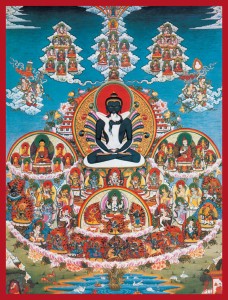
The following is an excerpt from a teaching by Jetsunma Ahkon Lhamo called “Conceptual Proliferation”
When we see the guru, we don’t look at the guru and say, Well, I like him or her, or, I don’t like him or her. We don’t think like that. That’s not a good reason to take a teacher; and it’s not a good reason to reject a teacher. We accept a teacher based on the clarity that they can show us, and whether they themselves have crossed the ocean of suffering. And so our view of the teacher is based on that.
Now, we find ourselves in a position where we are confused. We really don’t get the big picture. We really are experiencing everything that we experience due to a false assumption and false reaction and false set of conceptualizations that are built on all those erroneous views. How can we untangle this spaghetti kind of phenomena? Well, if we tried to pick out the pieces one by one, we would still be doing it from the point of view of the assumption of self-nature, so it’s never going to be clear. We really must rely on the perception of that one who has crossed the ocean of suffering. We really have to rely on the guidance of our teachers and the teaching of the Buddha. We really must rely on that.
The most important step that any student can make—and any good student will really have to make this at some point—is arriving at the conclusion, or coming to the understanding that you really just don’t know. That you really just don’t have a clue. Many students, when they first come to temple, and when they first begin on the spiritual path, feel a kind of arrogance, a kind of pridefulness. We talked about that the last time that we were together. They really assume that they know something, you know? ‘Well, I’ve had several different teachers and I’ve been on the spiritual path for some time now; and yes, I have a great affinity for spiritual things. And in fact, I myself have taught a few people, in my humble way.’ You know, and they sort of think like that. They come to the temple, and then they think, ‘Yes, well I’ve tried everything so now I think I’ll try some Tibetan Buddhism because you know, it’s like really exotic. Having been everywhere, I guess I’ll try Tibet.’ And so that’s what they think, really, when they come to the path. And really even some of the oldie, goldies over here were like that. Oh, oh, let me tell you. It was pew city for a long time. I actually had many of them come to me and tell me how wonderful they were and how helpful they had been in other people’s spiritual awakening. And all they needed from me was a reading. You don’t think that’s weird? Then you have some work to do. So, anyway, they experienced that, and you may actually be experiencing that. And you may feel just a little itchy under the collar when I talk about this, or a little uncomfortable.
At any rate, there will come a point in any proper student’s life when they might enter in that way. Then, at some point, they simply realize that they don’t know anything. They just haven’t got a clue in the world. And at that point, they finally have entered onto the path, because you cannot enter onto the path any other way. And every religion has a way of telling you that. I’m thinking about Christianity—that you have to enter Jerusalem through the eye of the needle. There is actually a place in Jerusalem, as I understand it, or was—I don’t know if it’s actually still there—where there is a tunnel or rock formation which is quite low, and it’s called the eye of the needle. Camels going into Jerusalem that way actually have to get down on their knees to enter into it. So that analogy is made: That you have to enter by getting down on your knees. You actually have to get off of the arrogance and the spiritual superiority that you have.
This may come as a shock to you; but, in fact, you are not getting messages from Jesus, or Buddha, from the Pleiades star system, or anybody else, as you thought you were every night at 7:00. You actually are not getting the inner directives that you thought you were. You’re just confused! And I’m really sorry about that. I really hate to break this to you, but you’re having a lot of problems. When you get to the point on the path that you can actually realize that, you’re somewhere and you’re in good shape. Until you realize that, believe me—and you’re not going to like my saying this and you might not come back—but you’re nowhere and you’re not in good shape.
Copyright © Jetsunma Ahkon Lhamo. All rights reserved



